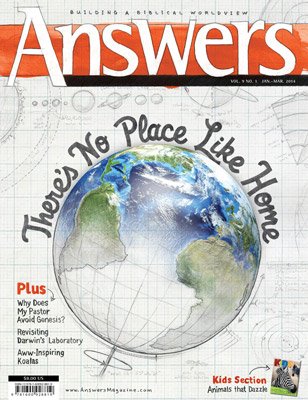Last Word
Last Word
In the heat of the battle, it’s easy to lose sight of our ultimate purpose. We’re not just trying to expose errors and combat evil. God has a much higher calling.

Illustration by Dave Ham
Mike Matthew, Editor in Chief
Here’s a quiz question for you: What do the moon, math, and the Field Museum have in common?
I know they’re covered in this issue of the magazine, but what do they truly share in common? Why’d we cover them, and why do we think you want to read them?
The answer is the filter that every article must pass.
The Greatest Sin
When I first thought about writing on this subject, I considered the title “The Greatest Sin.” But that’s negative.
“Avoid sin” may be one way to describe our highest purpose, but the Bible describes it in positive ways: glorify God, praise God, worship God, exalt God, adore God, love God.
That’s the purpose for which we were created, and that’s the purpose of this magazine. If any article fails to serve that purpose, it should be trashed.
“Loving God” may sound ethereal and impractical to modern, go-get-’em Westerners, but it’s not. Indeed, the most “practical” thing we can do is worship God. That’s the very job we were created to do.
More than anything else in life, we need help doing this main job. Turning people to a better understanding of their Maker and Savior, Jesus Christ—and equipping them to help others with this knowledge—is the most worthwhile task I can think of.
So we don’t study the moon to pass a science class, and we don’t study math to become better problem solvers. While these skills have potential, they lose their value unless God is glorified.
How’s It Done?
Consider the approach in the main feature “There’s No Place Like Home,” which examines the search for extrasolar planets and the minimum requirements for life (the ideal moon, star, and atmosphere). These four articles aren’t just science reports or “intelligent design” analyses that prove the unlikelihood of extraterrestrial life. They serve a higher purpose.
Our pale blue dot displays God’s handiwork, and we should glorify Him as the author of its wonders. Indeed, the beauty of a total solar eclipse—apparently unique to earthlings—deserves our notice just as much as the air we breathe and the sun which warms us.
Life is more than food and warmth; it is knowing and loving our beautiful, glorious God. That’s what we need to be telling others. Not just that they need to get their facts straight but that they need to be glorifying God.
The positive perspective is more condemning than the negative. The greatest evil is ascribing the Creator’s handiwork to impersonal forces. It’s like crediting Mona Lisa to the aimless meandering of a slug on a canvas.
The article “Is Math Just a Tool?” (p. 30) reiterates this same point. We don’t learn math merely to solve problems; we should learn math to glorify God. Without this higher purpose, our labors are vain, just as “the plowing of the wicked is sin” (Proverbs 21:4).
My article on a trip to Chicago’s Field Museum weaves this theme throughout. We miss the point if we go to such treasure houses simply to point out what’s wrong. Is that our sole purpose? Wouldn’t it be more consistent with our God-given mission to praise His handiwork in front of others?
Next quiz question. Which article states, “We should thank God for showing us His invisible attributes in the visible creation (Romans 1:20), and learn to appreciate the beauty and diversity that is so inspiring to both believer and nonbeliever alike”?
If you go back, you’ll find similar comments and encouragements throughout the magazine.
Glorifying God counts most; all the rest is detail. That perspective should shine through, especially in a magazine whose mission is “building a biblical worldview.”
Answers Magazine
January – March 2014
Placed safely in our solar system’s “goldilocks zone” and engineered with the perfect balance of atmosphere, chemicals, and water, our earth was miraculously formed to be inhabited (Isaiah 45:18). This issue examines the earth’s unique suitability for life. We’ll also investigate what seminaries are actually teaching our pastors, the possibility that viruses could be beneficial, and more.
Browse IssueRecommended Resources

Answers in Genesis is an apologetics ministry, dedicated to helping Christians defend their faith and proclaim the good news of Jesus Christ.
- Customer Service 800.778.3390
- Available Monday–Friday | 9 AM–5 PM ET
- © 2026 Answers in Genesis





